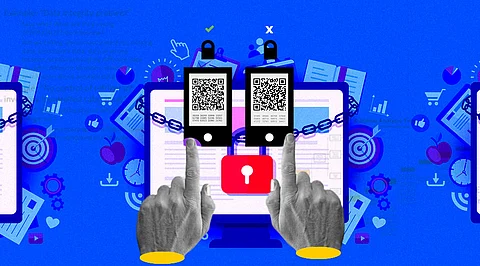
- Insights
- Cryptocurrencies
- Stocks
- White Papers
- Industry
- Geography
- Insights
- Cryptocurrencies
- Stocks
- White Papers
- Industry
- Geography


Fully Homomorphic encryption allows us to run analysis on data without ever seeing the contents. It is a form of encryption that permits users to perform computations on its encrypted data without first decrypting it. And it could help us reap the full benefits of big data, from fighting data privacy fraud to catching diseases early. Big data is a collection of data that is huge in volume, yet growing exponentially with time. One of the doctor's instruments of choice is no scalpel or stethoscope, it is far more powerful than that. This could be life-saving.
The relationships between genetic markers and diseases require an awful lot of data, more than anyone hospital has on its own. Most hospitals could pool their information, but it isn't so simple. Because putting together a large enough data set is more often than not, the limiting factor. Genetic data contains all sorts of sensitive details about people that could lead to embarrassment, discrimination or worse. Genetic data is personal data relating to inherited or acquired genetic characteristics of a natural person acquired through DNA or RNA analysis.
Microcosm of one of the world's biggest technological problems. It is the human race or human nature seen as an epitome. The inability to safely share data hampers progress in all kinds of other spheres too, from detecting financial crime to responding to disasters and governing nations effectively. But present new technology of encryption is making out data without anyone ever actually seeing it. This could help end the data privacy problem
Data could do good for all of us too. Data is a currency that helps make the modern world go around. That way, more people can look at it and conduct analysis of data, potentially drawing out unforeseen conclusions. That data has to be kept somewhere, which often means on a cloud storage server, owned by an external company.
There is an obligation to keep data privacy, not just because it is the right thing to do, but because of stringent privacy laws, such as the European Union's General Data Protection Regulation. Differential privacy is the way of maintaining people's privacy. Still, differential privacy has its limits. It only provides statistical patterns and can't flag up specific records.
In 1978, devised a theoretical way of making the equivalent of a secure glovebox to protect data called a homomorphism, it is a mathematical idea. It has the ability to map data from one form to another without changing its underlying structure.
Homomorphic encryption schemes allow to carry out a restricted set of operations, for instance only additions or multiplications. One approach to homomorphic encryption at the time involved an idea called lattice cryptography. This encrypts ordinary numbers by mapping them onto a grid with many more dimensions. A privacy technology start-up is achieving significantly faster speeds by helping customers better structure their data and tailoring tools to their problems.
Crypto Retreat has Taken a Big Toll on Crypto Exchanges in Q1: Report
Google's New Web3 Team will Capitalize on its Blockchain Dreams
Creating Avatar Boundaries is the Only Way to Give Value to Metaverse Lands
AzureML Will Put an End to Data Science Jobs in Near Future
You can Build a Successful Data Science Career with an Arts Degree
